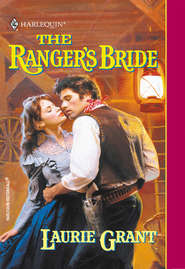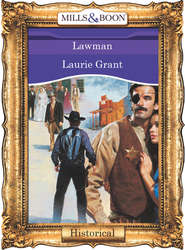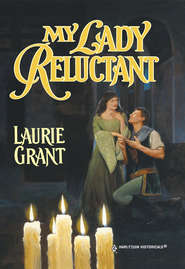По всем вопросам обращайтесь на: info@litportal.ru
(©) 2003-2024.
✖
My Lady Midnight
Настройки чтения
Размер шрифта
Высота строк
Поля
Perhaps he was merely bothered by the fact that she obviously didn’t like him, he mused as he sipped the wine his steward had brought him. He had sensed that fact even before he had forbidden his children to bring her into the castle, and he wondered why it was so. Perhaps she just didn’t like the Normans, either because they had been the masters of England for more than seventy years, or because she had suffered some personal loss at their hands—her virginity? Was she fleeing the very man who had stolen her innocence?
For she was no virgin, he had sensed. There was something about the bold way she had looked him in the eye, before dropping her gaze, that told him she had known at least one man intimately. And hadn’t liked what she had known.
All the more reason to make sure she was sent on her way on the morrow. She didn’t like him, and that being true, there was no need for her to remain within the walls of his castle after tonight. It was likely she had not even wished to stay. It was probably one of Peronelle’s impulsive ideas, and the woman had seen the chance of shelter from the coming storm that now sent rain drumming against the lead roof high overhead.
That Guerin had chimed in in support of Haesel’s visit had surprised Alain, but only momentarily. The serious young lad had a tender side, always bringing in strays and wounded birds and expecting Alain to help him succor them. Alain was proud of what he had taught the boy, and he knew he was going to miss him next year when he was old enough to be sent to another noble household for fostering—if the unrest that had threatened the realm ever since the empress had claimed the throne died down enough to permit him to send Guerin anywhere. Alain had resolved he would not send the boy into danger—he owed Guerin’s mother that much.
All at once Alain heard a shriek overhead, a shriek that could only have been Peronelle’s, and then the sound of weeping. His hand went to his hip, where the hilt of his sword had rested only minutes ago until Verel, his squire, had divested him of his mail. But it was not there, for he had changed into a long, comfortable tunic with a plain leather belt. He dropped the half-empty wine cup in the rushes and ran for the stairs. Good Lord, had the serf woman he had let into his hall turned vicious the moment she was out of his sight?
But before he could reach the curving stone steps, a white-faced Peronelle appeared around the corner of the stairs, followed by Guerin and Haesel, who were equally pale.
Peronelle ran down the steps and catapulted herself against him, throwing her arms around his legs as if all the demons of hell chased her.
“Perry, what is it? What’s she done to you?” he asked, even as his eyes met Haesel’s. “What did you do to her, woman?” he accused in English.
The Englishwoman blanched still further. “N-nothing, my lord!” she stammered. “It be the old woman, the nurse! We…we found her…dead, my lord!”
At first he stared at her, unable to make sense of her halting English words. But then, as their meaning sank into his brain, he ran past her and Guerin, who stood as if paralyzed halfway down the steps, and into the chamber in which the children and their nurse slept.
The old woman sagged on a padded chair near the unshuttered window, some mending project in her lap. Her head lolled against the high back of the chair, and her eyes were open, but she saw nothing. Even before he reached her side and took hold of her wrist, it was obvious from her dusky blue coloring that Ivy was dead. Her flesh was already cooling, and no pulse jumped against his fingers as he felt for a heartbeat. After a few seconds, he gently closed the old nurse’s eyes and said a prayer for her soul.
By the robe of the Virgin, why must the children have been the ones to find her? He imagined Peronelle and Guerin recoiling as they caught sight of those sightless, staring eyes, that slack mouth, and he shuddered in horror. Poor babes…
The old nurse had just recently reported a cessation of the nightmares that had plagued both children, but especially his daughter, after the death of Julia. And now it was likely the nightmares would begin all over again—and they would have no nurse to comfort them.
Unless…But no. He had already decided that having the young Englishwoman anywhere near him would only lead to trouble. He was not going to be foolish just because she was here precisely when his children needed another female to look after them. There were plenty of women in the village who would gladly take over as nurse to the lord’s children, yes, and be glad for a position in the castle that would give them a better existence than they had had. He would not court trouble by giving that position to a stranger.
Alain found the children huddled against Haesel in front of the fire, sobbing. She had her arms around them and was swaying softly, rocking them.
He saw Peronelle look up at the sound of his footsteps, her eyes betraying a wild hope.
“I am sorry, but it is true,” he said, keeping his voice gentle. “Ivy is dead.” As Peronelle’s renewed wails rose around him, he said, loudly enough that he hoped she would hear him, “She did not suffer, Perry. She was old, you know, and ’twas likely her heart just gave out. ‘Twas like falling asleep for her, children.” He included Guerin in his gaze. The boy was trying so hard not to cry, but his lip trembled and he shook, and Alain felt sorry for him. “’Tis all right to weep, Guerin, when someone we love dies. But we must remember Ivy is with God, for she was a good and pious woman, and she is happy in heaven.”
As Guerin gave in and the tears began to flood his cheeks, Peronelle raised tear-flooded dark eyes to Alain. “I want my Ivy! What will we do without her, Father? She’s been here forever—s-since before I was born!” She choked on a sob, and buried her face again against Haesel’s waist. He saw the Englishwoman caress the trembling shoulders of his daughter.
What indeed? he thought. Since they were without a mother, it was a question that would have to be resolved quickly, for they were not old enough to fend for themselves, and he could not always be with them.
“We’ll find someone in the village,” he promised, avoiding Haesel’s troubled eyes, worrying that although she could not speak French, she would certainly hear her name mentioned and wonder what they were saying about her. “I’m sure there is a good woman in the village who would like to come to the castle and be your nurse—”
“I want Haesel,” came Peronelle’s muffled voice.
“Nay, Haesel does not belong to this fief, and there must be somewhere she is obligated to be,” he said, giving a stern look at Haesel that warned her not to speak. “We must not keep Haesel from her duty.”
“But she’d stay here, if you asked her, Father. She’s already here, and I like her. Why can’t she stay? She says she is a free woman,” Guerin argued manfully, then sniffled. “Please say that she may remain as our nurse! Perry has already said she would obey her, and I will, too.”
There was little chance Haesel had told the truth about being a free woman, but without a brand on her forehead proclaiming that she had run away before and been caught, he had no way of proving it. And now his children were watching him, their eyes pleading.
He saw her watching him too, but he could not read her gaze. Certainly there was no pleading there. She was too proud for that.
He must stand fast, he knew, for his own sake if not his children’s. This woman was trouble. But he found himself murmuring instead, “What say you, Haesel? Are you willing to stay and be my children’s nurse? To be trustworthy and kind to Perry and Guerin day in and day out? It is not a position to assume lightly, woman, for my children are very important to me, as you have seen, and I would be merciless to anyone who harmed them.”
Some cloud passed over those blue eyes as she faced him, darkening them and then vanishing before she opened her mouth and said, “I will stay, my lord, and care for yer children. And I thank ye, my lord.”
He concentrated on Peronelle’s and Guerin’s expressions of joy, so that the Englishwoman would not see how pleased he was that she would stay.
“Very well. Children, perhaps you and Haesel could go to the kitchen for a while—no doubt Cook has some fresh-baked manchet loaves that you may sample. Then later you may help Haesel get settled in your chamber while I see to the prisoners.” In an undertone he added to Haesel, “I will see that the old nurse’s body is taken to the chapel while you are gone.”
“Very wise ye be, my lord,” Haesel whispered back. Then, just as the children began to tug at her hands, she smiled slightly before she allowed herself to be pulled after them.
He felt as if Rouquin, his mighty red destrier, had just kicked him.
Chapter Four (#ulink_ce6c92ad-c2c3-54d7-9ed8-ae6e4341fe0d)
An hour later, after Claire had been told Ivy’s body had been moved, she and the children left the kitchens, crossed the bailey and again ascended the stairs to their bedchamber. The children’s faces were besmeared with traces of the fresh butter that had been spread on the bread they had devoured warm from the oven, but beneath the shiny surface the cheeks of both children were pale as they hesitated at the threshold of the chamber they had shared with their old nurse.
“Is it…is sh-she gone?” Peronelle asked fearfully, her hands covering her face. But Claire saw that the child was peering between her fingers at the chair in which the old nurse had been sprawled, almost as if she expected the body of the nurse to reappear. Guerin, behind her, kept his hands at his sides, but Claire noticed his eyes kept darting into the shadowy corners of the room, as if he thought Ivy might be hiding there.
“Yes, she be gone. They took her body to the chapel, Peronelle,” Claire said, remembering to speak as an ignorant English serf woman would.
“But her spirit,” persisted Guerin, “what of it? Her soul? Will she come back—and haunt this chamber, because she died here?”
Claire felt a rush of sympathy for the frightened children, who were suddenly bereft of the woman who had been as a mother to them. She was sorry they had been the ones to find their beloved nurse dead, but perhaps it was really better that way, if one took the long view. Death would have a reality for them that it had not had for her when she’d been just a little girl—a bit younger than Peronelle. Claire had been told her mother had “gone away for a long time,” when in reality she had died in childbirth along with the son she had been struggling to give birth to. But Claire wanted them to remember their old nurse with joy, not with terror.
“Nay, she’ll not haunt this room, Guerin!” she said bracingly, laying a hand on both children’s shoulders. “How could she, a good woman like that, who loved ye both so much? She’ll go right to heaven to be with the saints, she will. But she’ll look down from heaven on ye here, and intercede with our Lord for ye. But ye’ll always remember how good she were to ye here in this chamber, won’t ye—taking care of ye, sleeping at night with ye…So in a way a part of her will always be here, in a good way, don’t ye see?”
The boy nodded, and the furrows in his forehead relaxed.
“But will they leave her body in the chapel? So we can see it there forever and ever?” queried Peronelle, sounding half hopeful, half frightened at the thought.
“No, lovey,” she said, kneeling in the rushes so that she and Peronelle were on the same level. “The castle women will wash her and lay her out on a bier, and someone will stay with the body until it’s buried.”
“Buried?” repeated Peronelle, horrified. “Put in the ground? She couldn’t breathe! I won’t let them!” she cried, her small body tensing, as if she intended to run back downstairs and prevent such an awful thing from happening.
Claire caught her gently by the arms. “Listen, child. Remember I told ye yer Ivy was already in heaven? ’Tis just her earthly body they’ll be burying, Peronelle. She’s already left that worn-out old body, and she has a new body, a perfect one that isn’t old, that won’t ever die,” she said, praying the child would believe her.
“And her hands won’t have all those painful knots, and in heaven she won’t get the dropsy whenever she eats salt pork like she did on earth, Peronelle,” Guerin put in. “Why, I’ll vow her hair is long and curly black as a raven’s wing, just as she always told us it was when she was a girl.”
Claire felt the moment when Peronelle’s rigid body sagged against hers, and she gave Guerin a grateful smile, silently blessing Guerin for his help.
Peronelle took a deep, shuddering breath. “That’s good that she’s all beautiful and happy in heaven, but I’ll miss her.” Then she started. “But I’m glad you’re going to be our new nurse, Haesel! Here, let me show you which bed is yours,” she said, tugging Claire’s hand and moving forward into the room.
They didn’t see Lord Alain again until just before sunset, when all the castle folk gathered for supper. Peronelle and Guerin, their faces washed, and wearing fresh clothing, led the way into the great hall and headed straight for the dais, where their father waited at the high table.
As they went, Claire took the time to look at her surroundings, which she had not done when she first entered. Hawkswell’s great hall, like Coverly’s, was two-storied and rectangular in shape. Old banners, their colors faded, hung from the ceiling rafters, and tapestries hung on the walls. The high-set windows faced the open eastern wall; the western wall formed part of the inner curtain of the castle, so the lighting that evening was from candles set at intervals on the tables and torches set in wall brackets. The rushes beneath her feet were relatively new, she noted approvingly, and their sweet smell hinted at mint and tansy strewn among them.
“Ah! There you are!” Alain said to his children. “Did you not hear the supper horn a few minutes ago?” He watched the three as they drew near.
“Yes, my lord father, but Haesel said we must change our tunics, for we looked rumpled as serf children who’d been plowing the fields!” Guerin informed him, using English where his father had spoken in French, a courtesy that warmed Claire’s heart.











